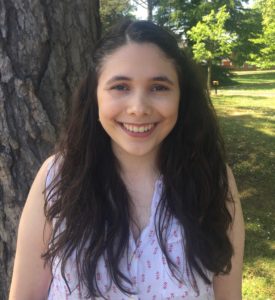Megan is a second year PhD student in Mathematics, CEMPS at the University of Exeter. She is the beneficiary of an STFC studentship for a “Multi-Spacecraft Investigation of Solar and Heliospheric Plasmas”. She graduated from the University of Exeter in 2018 with an MSci Mathematics (Geophysical and Astrophysical Fluid Dynamics). A strong believer in engaging the wider public in the scientific process, she runs a variety of outreach sessions with the University’s Widening Participation Team aimed at children and young people of all ages. She is also involved in I’m a Scientist Stay at Home, an online activity which helps classes and youth groups connect with scientists, engineers, their teachers, and each other during school closures in 2020.
I’m a passionate believer in access to education and after starting my PhD in 2018 I made sure to get involved in outreach and public engagement. Whilst I can only speak from my experience in science, outreach in the humanities is just as important to ensure children and adults can engage with, share, and pursue their passions, and this particularly relevant during lockdown.
The term ‘research’ is seen an abstract concept, and as a result of this academics are often seen as ‘other’, as different from the norm which is far from the case in my experience. Often, outreach and public engagement serves to demystify academia, both its processes and the people involved. Showing that we are people, that we are not just sat in dusty libraries or hidden in labs, arguing over minutiae in our fields, and this is more important now than ever. The public trust scientists in academia; as a group we are more trusted than our counterparts in industry and in policy making and government . Our current situation has fuelled a new desire to understand 1 2 the process behind the decision making and the science it is based on, but in order to do that those involved must articulate what it means to do research. It’s often difficult when immersed in work and years in academia to remember how we looked at this beforehand and PGRs are ideally suited to bridging this gap.
Last year, I got to grill Sir Patrick Vallance himself about improving public confidence in STEM experts , he stressed that “we need to stop positioning science advances as absolutist solutions, 3 and engage with audiences to show that science is more self-correcting than it appears.” To do this, we need to communicate just what the scientific process is, and how that relates to the experiments we do in our everyday lives, like figuring out the fastest route to the supermarket.
This sense of absolutism is also present in the way science is often taught in schools. Recently, working with a school, I was asked how the research community distinguished ‘fake-news’; we broadly discussed how we compare analysis and methodology, to critique and help build our own judgements, just like in school, but the concept of a peer review process entirely new to them. The process of evaluating and discussing the merits of a piece against what is presently known, is simply not taught in this way in schools, from a science perspective, they’re told what the science is but not about how we got there. This creates a large gap in the understanding of budding scientists, but one that engaging with academics helps to bridge. By humanising the people doing research and being honest about the process, about our failures, not just our successes we help to move away from absolutism towards understanding and meaningful engagement with research.
For me, outreach is a personal passion, but it also helps with my mood and focus. It reminds me why I love my PhD and of the extraordinary opportunities I am afforded through it. The children, adults, and teachers I have worked with, particularly over the last few weeks, have asked thoughtful and insightful questions that have genuinely challenged me. Instead of dragging myself to my desk, I’m filled with a renewed sense of optimism, gratitude and the curiosity that motivated me to start a PhD in the first place.
Written by: Megan Maunder – PGR Mathematics, CEMPS
Twitter: @Megan_Maunder
Staff profile: http://emps.exeter.ac.uk/mathematics/staff/mlm216
https://www.britishscienceassociation.org/public-attitudes-to-science-survey1 https://wellcome.ac.uk/reports/wellcome-global-monitor/20182 https://www.rsb.org.uk/policy/policy-events/voice-of-the-future

